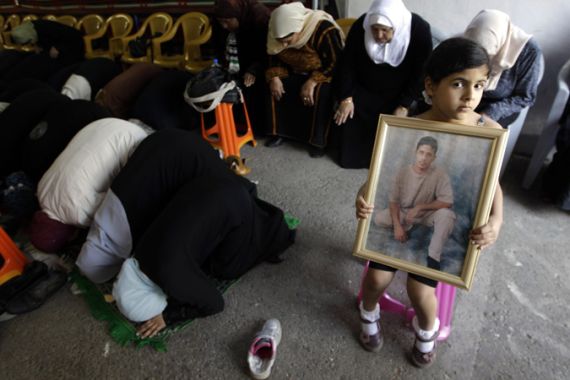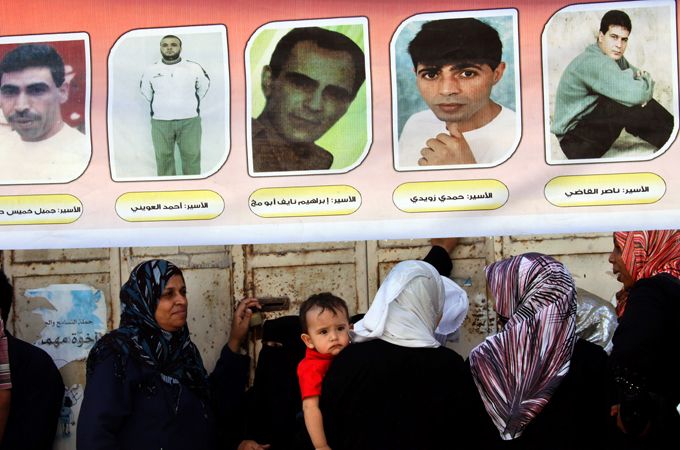Palestinian prisoners’ terms of release
An explainer of the terms of release for 1,027 detainees in exchange for Israeli soldier Gilad Shalit.

 |
| Not all Palestinian prisoners will be able to return to their homes, as several dozens face indefinite exile abroad [EPA] |
Israel’s justice ministry has released the names of 477 Palestinian prisoners who will be released in the first phase on Tuesday in exchange for Gilad Shalit, the 25-year-old Israeli soldier who has been held by Palestinian fighters for more than five years.
Two hundred and nineteen prisoners will return to their respective homes in the occupied West Bank, the Gaza Strip, Israel and Jordan after their release, without and restriction of movement.
“They will have to sign a declaration that he or she will not be involved in terrorist activities any more, but after that, there is no monitoring,” Emi Talmor, director of the Israeli justice ministry’s pardons department, told Al Jazeera.
Terms for the remaining 258 are categorised under two different types of release: “security arrangement” and “relocation”.
‘Security arrangement‘
Fifty-five prisoners, who will be sent to the occupied West Bank or the East Jerusalem, will be subject to a “security arrangement”, which restricts their freedom of movement, Talmor said.
“For example, if they live in Ramallah, they will not be allowed in Nablus or wherever because their terms limit them to the area of Ramallah.
| Charles Stratford on the language of the prisoners’ list |
“If they’re found in Tel Aviv or wherever, it will mean they violated the terms,” she said.
“And if I’m not mistaken, they will have to register once every other month.”
Those in the West Bank will report to the nearest station of the MATAK, the Israeli army’s co-ordination and liaison office, and those in East Jerusalem will report to the “regular Israeli police station”, she said.
Issa Qaraqa, the Palestinian minister of prisoner affairs, confirmed that the released prisoners under the ‘security arrangement’ would be “very restricted in their movement”.
Qaraqa said they would be allowed to move only within a certain radius from their homes and to check in every month with the local Israeli miilitary administration, who would be monitoring them.
When asked what kind of role the Palestinian Authority’s security services would play in monitoring the freed detainees, Qaraqa answered, “at this stage, absolutedly nothing”.
He denied that there would be any responsiblity given to any PA security for monitoring these prisoners.
‘Relocation’
Two hundred and three detainees would be “relocated” or deported “abroad” or to the Gaza Strip. Eighteen of them would be deported for three years, which means they can go home after that.
Matan Cohen, the spokesman of the Israeli justice ministry, said the reason for deportation is to prevent prisoners from returning to his or her “terror activities”.
| Charles Stratford reports on possible places of exile |
“For example, someone is living in one of the Palestinian cities in the West Bank and we feel that he is a dangerous man and that we don’t want him to start a terror network again because there is peace and quiet in the area – the arrangement for him is to go to the Gaza Strip or a foreign country,” Cohen told Al Jazeera.
“One point of reference could be what happened to those involved in the siege of the 2002 Church of Nativity in Bethlehem. Many of those guys were transferred to European countries.”
Of the 203 detainees, 40 would be deported “abroad”, Talmor said, without detailing which countries.
“It is up to the Egyptians to decide where they will be relocated to.”
All of the prisoners scheduled for release on Tuesday were gathered at two southern Israeli prisons on Sunday to facilitate their handover to Egypt, whose authorities would co-ordinate transporting them to the appropriate Palestinian authorities.
Egypt played a key role in brokering the historic swap agreement between Israelis and the Hamas.
When asked whether those relocated or deported would have to live in exile indefinitely, Talmor, the pardons department director, said: “There is some kind of arrangement for them, but I cannot talk about that.”
Media reports have said that Turkey will take in 40 prisoners set for exile, but Selcuk Unal, the Turkish foreign minister’s spokesman, told Al Jazeera that there are no discussions about Palestinians’ deportation to Turkey “at the moment”.